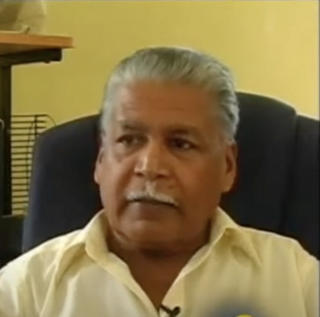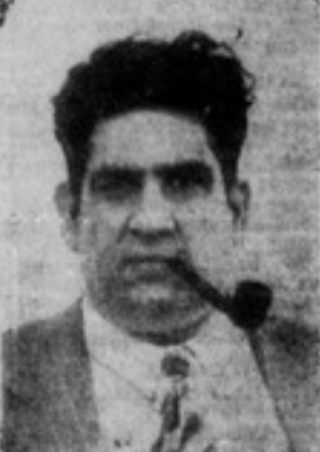Escalation
On 6 April 1970 a protester, Basil Davis, was killed by the police. This was followed on 13 April by the resignation of A. N. R. Robinson, Member of Parliament for Tobago East. The death of this protester led to the movement gaining momentum. On 18 April sugar workers went on strike, and there was talk of a general strike. In response to this, Williams proclaimed a State of Emergency on 21 April and arrested 15 Black Power leaders. Responding in turn, a portion of the Trinidad Defense Force, led by Raffique Shah and Rex Lassalle, mutinied and took hostages at the army barracks at Teteron. Through the action of the Coast Guard, led by Commander David Bloom and negotiations between the Government and the rebels, the mutiny was contained and the mutineers surrendered on 25 April.
Williams made three additional speeches in which he sought to identify himself with the aims of the Black Power movement. He re-shuffled his Cabinet and removed three Ministers (including two white members) and three senators. He also introduced the Public Order Act, which reduced civil liberties in an effort to control protest marches. After public opposition, led by A. N. R. Robinson and his newly created "Action Committee of Democratic Citizens" (which later became the Democratic Action Congress), the bill was withdrawn. Attorney General Karl Hudson-Phillips offered to resign over the failure of the bill, but Williams refused his resignation.
The history of Trinidad and Tobago begins with the settlements of the islands by Indigenous First Peoples. Trinidad was visited by Christopher Columbus on his third voyage in 1498,, and claimed in the name of Spain. Trinidad was administered by Spanish hands until 1797, but it was largely settled by French colonists. Tobago changed hands between the British, French, Dutch, and Courlanders, but eventually ended up in British hands following the second Treaty of Paris (1814). In 1889, the two islands were incorporated into a single political entity. Trinidad and Tobago obtained its independence from the British Empire in 1962 and became a republic in 1976.

Eric Eustace Williams was a Trinidad and Tobago politician. He has been described as the "Father of the Nation", having led the then British Colony of Trinidad and Tobago to majority rule on 28 October 1956, to independence on 31 August 1962, and republic status on 1 August 1976, leading an unbroken string of general elections victories with his political party, the People's National Movement, until his death in 1981. He was the first Prime Minister of Trinidad and Tobago and also a Caribbean historian, especially for his book entitled Capitalism and Slavery.

Tubal Uriah "Buzz" Butler, was a Grenadian-born Spiritual Baptist preacher and labour leader in Trinidad and Tobago. He is best known for leading a series of labour riots between 19 June and 6 July 1937 and for forming a series of personalist political parties that focused its platform on the improvement of the working class.
Afro-Trinidadians and Tobagonians are people from Trinidad and Tobago who are of Sub-Saharan African descent, mostly from West Africa. Social interpretations of race in Trinidad and Tobago are often used to dictate who is of West African descent. Mulatto-Creole, Dougla, Blasian, Zambo, Maroon, Pardo, Quadroon, Octoroon or Hexadecaroon (Quintroon) were all racial terms used to measure the amount of West African ancestry someone possessed in Trinidad and Tobago and throughout North American, Latin American and Caribbean history.

The University of the West Indies (UWI), originally University College of the West Indies, is a public university system established to serve the higher education needs of the residents of 18 English-speaking countries and territories in the Caribbean: Anguilla, Antigua and Barbuda, The Bahamas, Barbados, Belize, Bermuda, British Virgin Islands, Cayman Islands, Dominica, Grenada, Guyana, Jamaica, Montserrat, Saint Kitts and Nevis, Saint Lucia, Saint Vincent and the Grenadines, Trinidad and Tobago, and Turks and Caicos Islands. Each country is either a member of the Commonwealth of Nations or a British Overseas Territory.
The Rodney riots were riots and civil disturbances in Kingston, Jamaica in October 1968.

The Democratic Labour Party was the main opposition party in Trinidad and Tobago from 1957 till 1976. That party was the party which opposed the People's National Movement (PNM) at the time of Independence. After several splits brought about by leadership struggles, the party lost its hold on the Indo-Trinidadian community in the 1976 General Elections and was displaced in parliament by the United Labour Front under the leadership of Basdeo Panday, a former DLP senator. The party was the representative of the ethnic Indian community in the country; however Indian Muslims and Christians were said to be less loyal to the party than Indian Hindus.

Raffique Shah is a Trinidad and Tobago trade union leader and political commentator. He is also a former Member of Parliament and mutineer, having led a mutiny of Trinidad and Tobago Regiment in 1970.

Albert Maria Gomes was a Trinidadian unionist, politician, and writer of Portuguese descent, was the first Chief Minister of Trinidad and Tobago. He was the founder of the Political Progress Groups and later led the Party of Political Progress Groups. He was active in the formation of the Democratic Labour Party (DLP) in Trinidad and Tobago and played a role in forcing Sir Alexander Bustamante out of the Federal Democratic Labour Party. Gomes briefly led DLP in 1963 when factions loyal to briefly ousted Rudranath Capildeo after Capildeo left Trinidad and Tobago to take up a position at the University of London. However, the rank and file of the party stood behind Capildeo, and Gomes left the party.

The Oilfields Workers' Trade Union (OWTU) is one of the most powerful trade unions in Trinidad and Tobago. Currently led by Ancel Roget, the union was born out of the 1937 labour riots, the union was nominally led by the imprisoned TUB Butler but was actually organised by lawyer Adrian Cola Rienzi.
Social unrest has shaped the development of Trinidad and Tobago since the middle of the 19th century. Attempts by the British colonial government to crack down on the celebration of Carnival sparked the Canboulay Riots in 1881 and 1884. Attempts to control the celebration of Hosay by the Indian population culminated in the Hosay Riots in 1884. In the early 20th century, the Water riots culminated in the destruction of the Red House, the seat of government, by a mob of protestors.
The National Union of Freedom Fighters (NUFF) was an armed Marxist revolutionary group in Trinidad and Tobago. Active in the aftermath of the 1970 Black Power Revolution, the group fought a guerrilla warfare campaign to overthrow the government of Prime Minister Eric Williams following the failed Black Power uprising and an unsuccessful mutiny in the Trinidad and Tobago Regiment.

The National Joint Action Committee (NJAC) is a political party in Trinidad and Tobago.
Reginald Andrew Lassalle, better known as Rex Lassalle, is an alternative medicine practitioner and former lieutenant in the Trinidad and Tobago Regiment who was a leader of an army mutiny in April 1970 as part of the Black Power Revolution.
Makandal Akhenation Daaga was a Trinidad and Tobago political activist and former revolutionary. He was the leader of the 1970 Black Power Revolution. During the unrest he was arrested and charged.
Gordon Rohlehr was a Guyana-born scholar and critic of West Indian literature, noted for his study of popular culture in the Caribbean, including oral poetry, calypso and cricket. He pioneered the academic and intellectual study of Calypso, tracing its history over several centuries, writing a landmark work entitled Calypso and Society in Pre-Independence Trinidad (1989), and is considered the world's leading authority on its development.
Black Power in the Caribbean refers to political and social movements in the Caribbean region from the mid-1960s to mid-1970s that focused on overturning the existing racist power structure. Guyanese academic Walter Rodney famously defined the movement as follows: "Black Power in the West Indies means three closely related things":
- the break with imperialism which is historically white racist
- the assumption of power by the black masses in the islands
- the cultural reconstruction of the society in the image of the blacks

University of the West Indies at Cave Hill is a public research university in Cave Hill, Barbados. It is one of five general campuses in the University of the West Indies system.

Christina F. Lewis was an Afro-Trinidadian community worker, trade unionist and women's rights activist. Through her political activities, she worked to improve the conditions of workers and women, advocating for universal adult suffrage and for British citizens of the West Indies to have the same rights and privileges as their counterparts in Britain. As a socialist, Pan-Africanist, and feminist, she merged anti-colonial policies with the struggle for women's rights and against racism.
Selwyn Ryan was a Trinidad and Tobago political scientist and pollster. Ryan has been described as "the author of record for the nation's modern political history" and "the most prolific and influential intellectual in post-colonial Trinidad". He was Professor Emeritus at the University of the West Indies, St Augustine campus.










